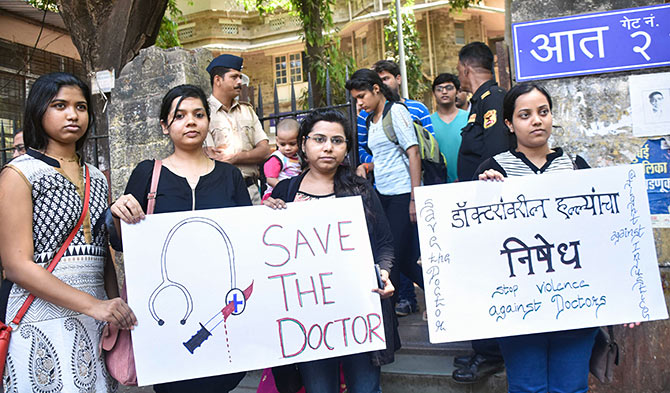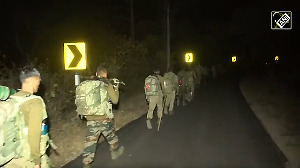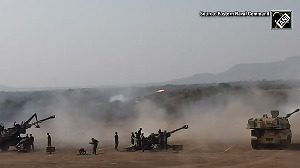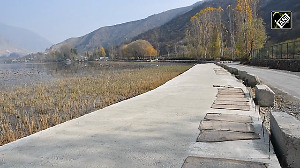Last week, some 4,000 doctors in Maharashtra went on strike to protest against assaults on resident doctors.
After an ultimatum issued by the Bombay high court, the doctors returned to work on March 25.
Dr Mrigank Warrier explains why the resident doctors' movement is far from over.

Photograph: Sahil Salvi
March 12, 10 pm. An accident victim, with a serious head injury, is brought to the District Civil Hospital, Dhule.
After preliminary treatment by the casualty medical officer and examination by a general surgeon, he was examined by orthopaedic surgeon Dr Rohan Mhamunkar.
Dr Mhamunkar informed the patient's family that if a CT scan reveals brain injury, the patient would require the expertise of a neurosurgeon and they may have to shift him to a bigger, better hospital.
The reason?
After 27 years of existence, the Dhule hospital -- which claims to provide healthcare 'not only to Dhule, Nandurbar, Jalgaon and Nashik districts, but also to districts of Madhya Pradesh and Gujarat' -- does not have a neurosurgeon on its staff.
The patient's family responded by slapping, beating Dr Mhamunkar and tearing his clothes.
Video footage showed a mob punching him, kicking him, climbing onto a hospital bed to stomp on him as he collapses. They also thrashed him with a metal cot (bed).
Dr Mhamunkar suffered extensive injuries. A skull fracture, a brain injury and loss of vision in one eye, with the possibility of it being permanent.
All he did was tell the patient's relatives the truth, in time.
Over the next 13 days, at least seven more attacks on resident doctors were reported from Maharashtra.
One was on a polio-affected doctor in the presence of security guards.
Another involved a doctor being wounded by a drug addict's shaving blade after the policemen who brought him ran away.
Yet another involved a nurse.
Resident doctors are the engines that run hospitals, as well as the rails on which they run.
For the patient, they are the face, hands and voice of the hospital.
These 20 and 30 year olds are the first to attend to every emergency.
They have no fixed working hours, often working for two days at a stretch with little food and no sleep, and bathe when they can afford the luxury.
They admit patients, draw blood, fill forms, track down reports, push gurneys (stretchers) in the absence of the ward boy, arrange for blood from the blood bank, persuade private diagnostic labs to give poor patients a discount on necessary tests not offered by their hospitals and negotiate with medical representatives to provide life-saving medications unavailable in the dispensary at a subsidised rate, often chipping in with some of their own money.
In the midst of this, they examine patients, manage overcrowded emergency rooms and OPDs, prioritise cases, arrive at a diagnosis, initiate treatment, follow up recoveries and read medical journals, make case presentations, and study, every chance they get, because, after all, they are also studying to earn post-graduate degrees.
At some point in the last two weeks, their patience and tolerance -- far greater than average mortals hope to possess -- snapped.
They went on 'mass leave'. They called a strike.
Not against their 10-in-a-room living conditions, endless working hours or the hundred other menial tasks assigned to them.
They struck work to protest against the increasing threat of losing their lives on duty.
The protest was not against their patients -- which also includes an infinite, heterogeneous group of grateful survivors, as well as potential attackers.
Doctors exist because patients do.
No, their protests were against the government, which, time and again, had failed to provide a safe environment in which they could work, live or even think.
The authorities responded to this protest by suspending them, evicting them from their hostels, and threatening to revoke their degrees.
The chief justice of the Bombay high court said they were 'unfit to be a doctor' and 'if you keep stretching the matter like this, the public will come and hit you.'
Medical Education Minister Girish Mahajan threatened to hold back six months of salary.
While condemning the violence against doctors, Maharashtra Chief Minister Devendra Fadnavis -- instead of admitting his government's failure to spend more on healthcare -- asked in the state assembly: 'What is the difference between those who beat doctors and those doctors who allow patients to die?'
He claimed that society has 'given them the status of gods' and accused doctors of forgetting the Hippocratic Oath they took, which also contains the line: 'Above all, I must not play at god.'
Castigating resident doctors, he said things the doctors would rather like to tell the government instead: 'How much patience do we show? And when the patience of the public is exhausted, what do we do? We will not forgive them if they continue to let people die. Enough is enough.'
In the Dystopian novel Atlas Shrugged by Ayn Rand, a stellar surgeon explains why he quit his profession: 'I observed that in all the discussions that preceded the enslavement of medicine, men discussed everything -- except the desires of doctors. Men considered only the 'welfare' of patients, with no thought for those who were to provide it. That a doctor should have any right, desire or choice in the matter, was regarded as irrelevant selfishness; his is not to choose, they said, only 'to serve'... Their moral code has taught them to believe that it is safe to rely on the virtue of their victims. Well, that is the virtue I have withdrawn. Let them discover the kind of doctors that their system will now produce'.
Indian doctors are not there yet. They are getting there.
They ensured this strike was different in many ways: 4,000 resident doctors did not buckle to political and judicial pressure for six days.
Letters of support poured in from every resident doctors' association in the country.
The All India Institute of Medical Sciences doctors symbolically wore a helmet to work. Other Delhi doctors struck work for a day.
Medical college faculty -- who worked day and night to care for admitted and emergency patients and ensured that fewer people died than the daily average -- fully supported the residents, whose work they were doing.
Private practitioners shut OPDs and even consultants at five-star hospitals cancelled appointments in solidarity with their juniors.
Most importantly, the residents did not end their strike after verbal promises or because CM Fadnavis agreed to fulfill each of their basic demands for better security in writing.
They resumed work only when they saw those promises being implemented.
For the first time, doctors came together and won.
In hindsight, it was a bittersweet victory. The Dhule patient died.
And after 21 years of being a teaching hospital, the (Dhule institute) still doesn't have seats even for resident doctors, forget qualified neurosurgeons.
Speaking to striking residents as an Opposition MLA seven years ago, Mr Fadnavis had said: 'You have gone on strike for the patients' needs. Machines are not working, new ones are not being purchased, the condition of hospital buildings and hostels is bad. If the hospital itself is sick, how can it help patients who are sick?'
The attitude of doctors towards the government now echoes the words of a sympathetic news anchor: 'Do more. Do better. Do your job. Because, we are watching.'
Dr Mrigank Warrier, 26, worked at the Lokmanya Tilak Municipal Medical College and Hospital, Sion, north-east Mumbai, and writes about healthcare issues.











 © 2025
© 2025